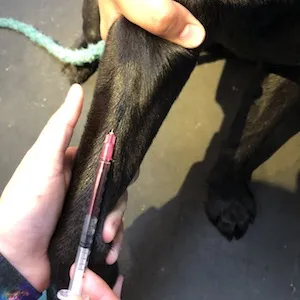Heartworm disease is a severe and potentially fatal condition affecting dogs, cats, and ferrets. It’s caused by heartworms that reside in the heart, lungs, and associated blood vessels, leading to severe lung disease, heart failure, and damage to other organs. Prevention is key, but recognizing the signs of heartworm, especially in the late stages, is crucial for timely intervention.
Heartworm disease is transmitted through mosquitoes. When a mosquito bites an infected animal (dog, fox, or coyote), it picks up microfilariae (baby heartworms) circulating in the bloodstream. These microfilariae develop into infective larvae within the mosquito. When the infected mosquito bites another susceptible animal, the larvae are deposited on the skin and enter the new host through the bite wound. It takes about 6 months for the larvae to mature into adult heartworms.
Early detection and treatment are vital for managing heartworm disease effectively. While early stages may present subtle or no symptoms, late-stage heartworm disease exhibits more pronounced clinical signs.
Understanding the Progression of Heartworm Disease
In dogs, heartworms mature into adults, mate, and produce offspring. Untreated, a dog can harbor hundreds of worms, leading to lasting damage to the heart, lungs, and arteries. Heartworm prevention is crucial, and early treatment, when needed, is essential.
Cats are atypical hosts, and most heartworms don’t survive to adulthood. Cats typically have only one to three worms, or none at all. However, even immature worms cause damage, known as heartworm-associated respiratory disease (HARD). The medication used to treat heartworm in dogs cannot be used in cats, making prevention the only means of protection.
Ferrets are highly susceptible to heartworms. The disease in ferrets is a mix of what is seen in dogs and cats. Like dogs, ferrets are extremely susceptible to infection and can have larger numbers of worms than cats, but like cats, even a low number of worms can cause devastating disease due to the small size of the heart. Diagnosis is often difficult, and there is no approved treatment, making prevention imperative.
Symptoms of Late Stage Heartworms in Dogs
 dog heartworms
dog heartworms
In the early stages of heartworm disease, many dogs show few or no symptoms. However, as the infection persists, symptoms become more apparent. Active dogs, heavily infected dogs, or those with other health issues often show pronounced clinical signs. Recognizing these late-stage symptoms is crucial for seeking immediate veterinary care.
Late-stage symptoms of heartworm disease in dogs include:
- Persistent Cough: A mild, persistent cough is one of the early signs, but it can become more pronounced and frequent in later stages.
- Reluctance to Exercise: Dogs may become less willing to play or go for walks, showing a decreased interest in physical activity.
- Fatigue After Moderate Activity: Even after light exercise, dogs may become easily tired and out of breath.
- Decreased Appetite: A noticeable reduction in appetite and food intake is common.
- Weight Loss: Unexplained weight loss can occur despite normal eating habits in the early stages.
As the disease progresses, more severe symptoms can develop:
- Heart Failure: This can manifest as difficulty breathing, increased heart rate, and weakness.
- Swollen Abdomen: Excess fluid accumulation in the abdomen (ascites) can cause a swollen belly appearance.
Caval Syndrome: A Life-Threatening Condition
In severe cases, dogs with large numbers of heartworms can develop caval syndrome, a life-threatening condition caused by a sudden blockage of blood flow within the heart.
Signs of caval syndrome include:
- Sudden Onset of Labored Breathing: Difficulty breathing and rapid, shallow breaths.
- Pale Gums: Gums may appear pale due to decreased blood flow.
- Dark Bloody or Coffee-Colored Urine: This indicates kidney damage and the presence of blood in the urine.
Caval syndrome requires prompt surgical removal of the heartworm blockage, as few dogs survive without immediate intervention.
It’s important to consider that sign and symptoms of parvo in dogs can sometimes be confused with other conditions.
Diagnosis and Treatment
If you observe any of these symptoms in your dog, consult your veterinarian immediately. Early diagnosis and treatment are essential for improving your dog’s chances of recovery.
Diagnostic tests include:
- Heartworm Antigen Test: This blood test detects the presence of adult heartworm proteins.
- Microfilariae Test: This test identifies the presence of microfilariae in the bloodstream.
- X-rays and Ultrasound: These imaging techniques help assess the extent of heart and lung damage.
Treatment for heartworm disease in dogs typically involves:
- Stabilization: If your dog is showing severe symptoms, the first step is to stabilize their condition with appropriate therapy.
- Medication: The primary treatment involves a series of injections of melarsomine, a drug that kills adult heartworms.
- Restricted Exercise: Strict rest is crucial during and after treatment to minimize the risk of complications.
- Additional Medications: Your veterinarian may prescribe additional medications to manage inflammation, pain, and other symptoms.
Prevention is Better Than Cure
Heartworm prevention is significantly safer and more cost-effective than treating the disease. Consult your veterinarian about the best heartworm prevention options for your dog, including monthly chewable tablets, topical medications, or injectable preventatives.
 dog blood
dog blood
The American Heartworm Society recommends year-round heartworm prevention for dogs, regardless of location. Mosquitoes can thrive indoors, and the risk of infection is always present.
